The truth is slippery. When often the most common piece of evidence is an eyewitness account, the how’s and the why’s of an event are often very murky. Experience is inherently subjective. Life is inherently subjective. The truth is an agreed-upon construction that’s hopefully being constructed by people who actually have positive, humanist beliefs rather than destructive ones. What’s compelling about a conspiracy, then, is that there’s a secret truth. Whatever’s been accepted about the world en-masse is actually just a surface made smooth enough for society and civilization to glide upon.
Reality is messy and fluid, an ocean crashing against dark shapes in the distance. A conspiracy is attractive because being familiar with this secret shore means you could potentially participate in the world in a way that is more advantageous to your wellbeing or, at the very least, can justify why you feel the way you do. Why you feel scared, cheated, angry, sad, taken advantage of. Popular culture is littered with fictional conspiracies, but perhaps more importantly, present day reality is as well. CONTROL, Remedy Games’ new Metroidvania-style shooter, is engaged with this concept of conspiracy, the power of keeping secrets and the profound, almost drug-like excitement of knowing the truth. But most importantly, the real importance of belief without the need for confirmation.
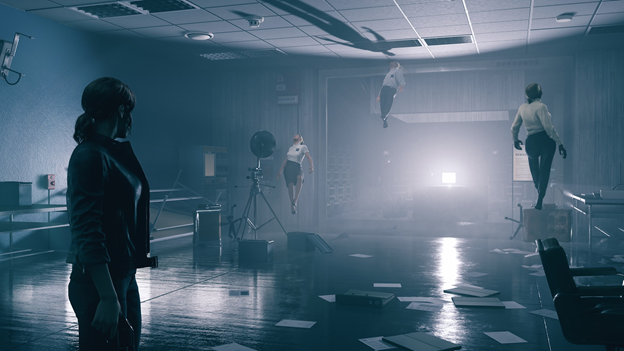
Also a mystery: how are everyone’s shirts still tucked in?
CONTROL centers on Jesse Faden’s search for her missing brother in the mysterious office of the Federal Bureau of Control, a secretive branch of the U.S. government tasked with understanding, capturing, and “controlling” supernatural phenomena deemed dangerous or useful by the powers that be. Jesse’s search is a deep-dive into the office building the bureau is located in, itself a supernatural place of power. It’s referred to as The Oldest House, a sort of Brutalist concrete nightmare that also acts as a portal to other dimensions, one of which seemed to produce the antagonists of the game, the HISS, an evil sonic frequency that when heard, mutates and controls the listener into doing all sorts of diabolical things.
Jesse searches for her brother, battles the HISS, and learns more about the various supernatural objects and cases the Bureau handled in the past, armed with the supernatural gun-of-all-trades Service Weapon (imagine a pistol, but made of suspicious floating black rock) and a growing list of “paranatural” powers. While initially apprehensive, both for the secrets she’s keeping and the apparent danger of The Oldest House, she comes to truly enjoy the strangeness of it all. Knowing that all this time what she assumed about the world wasn’t some delusion but rather some version of the dark truth is a relief. That premise alone is a convincing reason to play, but the execution in the game itself often stumbles.
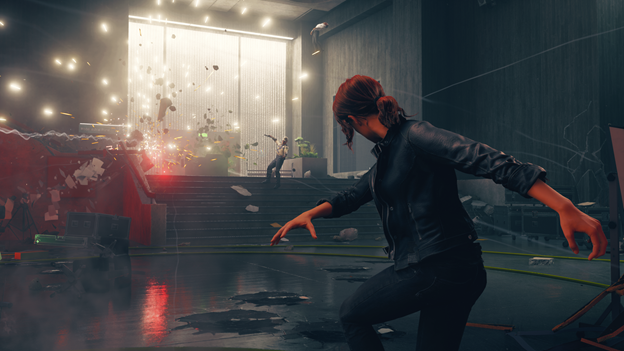
The kind of satisfaction that can only come with psychically flinging shit at people
Like many games that have come before, and likely many that will come afterwards, CONTROL’s large, open-world-y elements are littered with enemies to kill on the way to arena-style locked-off rooms where more enemies and frequently named “bosses” reside. It’s not the most thrilling loop for a game, but is often spiced up by an aggressive physics engine and the abilities your character’s given for hunting down humorously mundane objects. These “Objects of Power” in the game are frequently unassuming. Jesse interacts with a floppy disc, merry-go-round horses (hey!), and rubber ducks in the first hours of the game. These give you telekinesis, shields, and eventually the ability to fly. The problem comes in the use of these abilities against the sprinkling of enemies throughout the levels. When it works, it’s satisfying to fling enemies around and at each other, to turn them against each other, to lift up a desk and just throw it against the wall and watch papers fly everywhere. The thing is, it often doesn’t work. The game chugs displaying the individually animated items. Sometimes everything moves in slow motion. Sometimes it locks up. Sometimes it just crashes. Frequently the game has crashed and ejected the game disc. As if it doesn’t want me to play it.
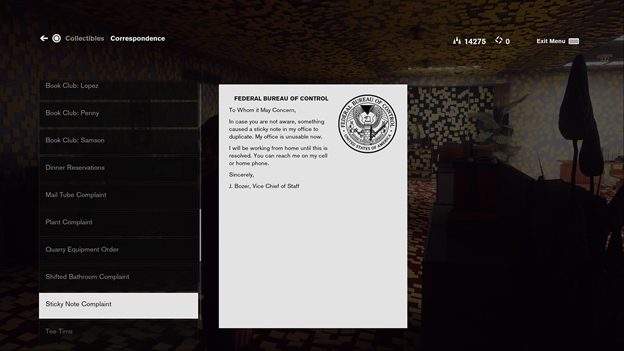
The less said about the sticky notes, the better
So what ends up being the compelling part of CONTROL are its collectables. Fragments of stories, worldbuilding and lore, levity, FMV, a type of creepypasta, podcast episodes, a potentially self-referential live-action puppet show that might be made internally in the game’s mysterious government institution or might be a hallucination of the protagonist’s traumatic past, a series of photographs of the previous boss each with an ominous self-help quote, letters sent to imaginary unreachable recipients detailing haunted fish, ghostly presidents, and a machine god.
It’s wild stuff, but it is, in a way, the figurative skeleton of CONTROL, a game that doesn’t hide the fact that its assets repeat more frequently than they should. Or that it dislikes animating mouths (or cutscenes). Or that it can’t run to save its life anywhere other than a high-powered gaming PC. It bakes all these in as features. CONTROL is about a government agency trying and failing to get a handle on mysterious supernatural objects, but it itself is made from a collection of them and it feels like a rickety patchwork in much the way you’d expect. The gameplay of CONTROL can’t fully live up to the narrative bits, but the narrative bits, the truth of the game, are so compelling that the worst become easier to ignore.
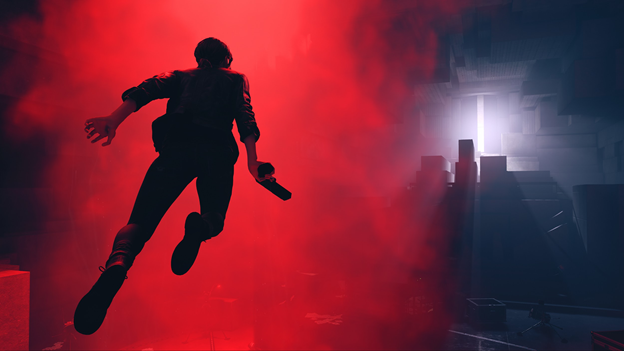
The obvious light at the end of the tunnel
The largest conspiracies are often the most obvious. Removing all context and any political opinions you might have, being told that there was a cabal of rich people who bought underage sex in exchange for large sums of money and research into life-extending science feels obvious. Of course they did. Not because rich people tend to be vampiric pedophiles (evidence remains inconclusive, but is certainly trending in a direction), but rather that being rich means you can do whatever you want, whether in the arenas of love-making or living forever. Sometimes the obvious is a good cover. No one expects the obvious, because it seems stupid. But sometimes the obvious is the only answer, because the power of the conspirators and the depth and breadth of their secrets are so large they become that dark shore themselves.
The “Objects of Power” in CONTROL gain their power through the public consciousness. How they’re thought of shapes what they do and how much they do it. The game suggests that this could even change over time given how perception shifts (which highlights the importance of capturing and containing these items and controlling the narrative around). I think the understanding of scandal and conspiracy can work much the same. Are we better for knowing the truth? Often yes, but the danger of the constant rumination on the secret order of the world is that the secrets become facts and then just become the way things are. We are often out-matched by the things that operate in the dark.
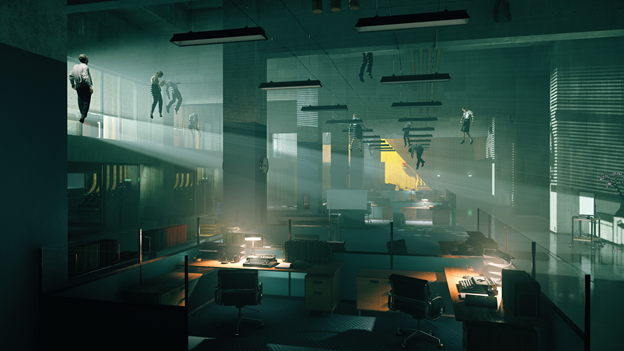
Another busy day at work
We, like Jesse, enter into the dark building of life with only a rock gun (work with me on this analogy) and are soon surrounded by the twisted shapes of the people who work there. We play the game until it can’t be played anymore, because it refuses to be (because playing games on a launch edition PS4 in 2019 is an ordeal). Covering endless scandal sucks all the oxygen out of the room, making it either the only thing that matters or old news. It’s endlessly frustrating that a game as good as CONTROL, with its fantastic aesthetics and interesting story are hampered by technical issues and frequently frustrating gameplay, but I’m remiss to let that be the only thing that’s true about it.
CONTROL is at its most enjoyable when it’s revealing information to you. Information you’re not supposed to know. In contrast in the strange times we live in, the joyful moments have not come from what’s revealed to us (already noted illuminati sex ring, previously unmentioned white nationalists groups in every police force), but from the positive actions taken by people with strong pre-existing beliefs (strikes at Amazon, climate marches, etc.). CONTROL is fun for its conspiracy, but truly compelling because it lets you take action within it and against it. Action that can only be taken because Jesse believed something beforehand. Navigating the dark rocky shore of the truth, not because its sharp crags have been revealed to you, but because you have the wherewithal to keep stepping carefully forward.


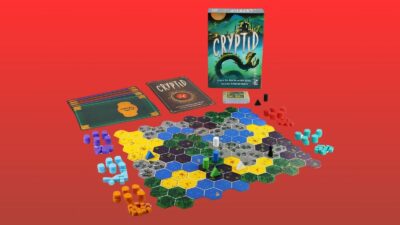


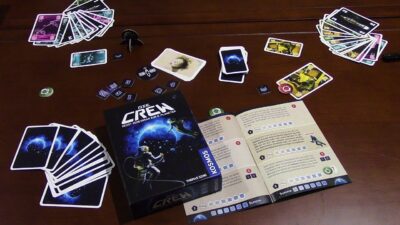










Comments